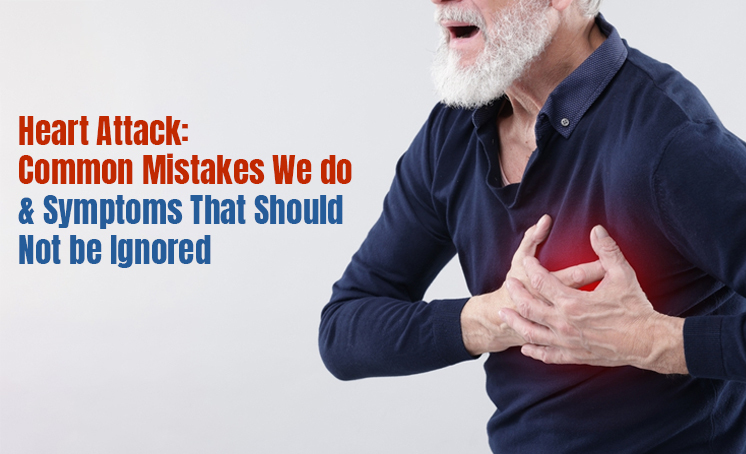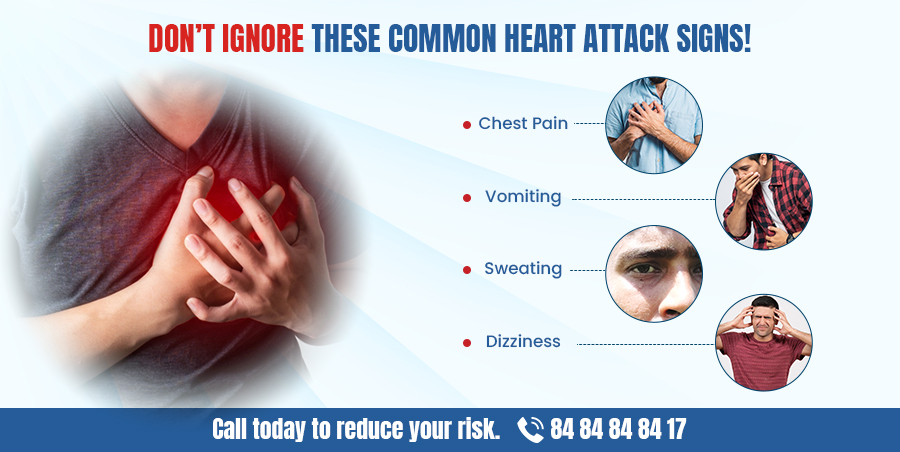Heart Attack: Common Mistakes We do & Symptoms That Should Not be Ignored

Heart attack is now one of the top reasons for emergency admissions in India and the numbers are rising fast in cities like Delhi NCR where long commutes, stress and lifestyle habits collide. Many studies show that cardiovascular disease accounts for 31% of all deaths in India and a major share of these are linked to heart attacks that were not treated in time.
In our own experience at PSRI Hospital, it is rarely a lack of treatment that hurts the outcome, it is the delay in reaching hospital, often because early warning signs were missed or it was ignored as simple gas or “just stress.”
The most common mistakes people make during a heart attack are very relatable. Someone feels chest discomfort and decides to “wait and watch” for a few hours, they take home remedies, they call a nearby clinic instead of emergency services or they choose to drive themselves to the hospital because “it will be faster.” At the same time, important symptoms such as radiating arm pain, shortness of breath or cold sweat are ignored, even though these should trigger urgent care.
This blog by heart specialists helps you spot common mistakes, know the symptoms you must not ignore and understand when to visit our cardiologists immediately.
Common Mistakes We do Before and During a Heart Attack
A heart attack becomes dangerous when early signs are missed and wrong steps are taken:
Prevention Mistakes That Silently Raise Your Risk
Heart attack usually starts years before the first chest pain. It begins with risk factors that stay uncontrolled.
Key risk factors include:
- High blood pressure and hypertension that are not checked or treated regularly.
- High cholesterol that damages arteries over time.
- Diabetes that affects vessels and nerves.
- Smoking and tobacco use in any form.
- Obesity and increased waist size.
- More than 40 years of age.
- Family history of coronary artery disease or early heart attack.
Everyday life adds more strain. Constant stress, anxiety, long working hours and poor sleep cause repeated sleep disturbances. Some people have sleep apnea where breathing stops for short periods at night. Many ignore exercise-induced angina where mild chest pain or chest tightness starts only when they walk fast or climb stairs.
When these issues stay unaddressed, prevention fails. Lifestyle modification is delayed. Dietary factors like high salt, sugar and trans fats remain unchecked. Physical activity stays low. Alcohol use becomes regular. Medication adherence for BP, diabetes or cholesterol is poor. This mix makes a blocked artery more likely in future.
Ignoring Early Warning Signs Before a Major Event
Before a big event, the heart often gives early warning signs. These may feel like:
- Brief chest discomfort, pressure, squeezing or fullness in the centre or left side of the chest.
- Shortness of breath on climbing stairs or walking a usual distance.
- Mild arm pain, neck pain, jaw pain, back pain or stomach pain with effort.
- Fatigue or unusual tiredness that feels “different from usual tiredness.
These episodes are often short. Doctors call them episodic pain. People ignore symptom frequency and chest discomfort duration. They blame acidity or overwork instead of using proper symptom recognition. They miss the chance for early risk assessment and prevention.
Simple steps help here: write down symptom triggers, make basic symptom documentation and share your medical history with our cardiologist team.
Mistakes During a Suspected Heart Attack
When a heart attack starts, every minute of blood flow matters. Here are key mistakes that worsen treatment delay and diagnosis delay:
- Waiting at home to see if it settles, even when chest pain or chest tightness is new or severe.
- Treating symptoms with home remedies for “gas”, which leads to clear symptom misinterpretation.
- Calling a family doctor or local clinic instead of activating proper emergency response.
- Driving yourself or asking a family member to drive, even when there is dizziness, lightheadedness, sweating or cold sweat.
- Giving only half the story in the ER, which causes symptom underreporting and longer delay in diagnosis.
During a heart attack, the heart muscle receives less blood flow and oxygen supply because a blocked artery reduces circulation. This can lead to serious rhythm problems such as palpitations, rapid heartbeat or irregular heartbeat and later to heart failure. Ambulance teams can start treatment on the way. Driving on your own is risky.
Recovery Mistakes After a Heart Attack
After treatment for myocardial infarction, many people feel better and slip back into old habits. Common mistakes are:
- Stopping heart medicines on their own and breaking medication adherence.
- Skipping follow-up visits and cardiac rehab sessions.
- Ignoring new symptom clusters such as chest discomfort with breathlessness or new fatigue.
- Returning to smoking, high stress, poor diet and low activity
These choices increase the chance of another heart attack and raise hospital readmission prediction risk. At PSRI Hospital, patient education focuses on prevention, symptom awareness and long-term lifestyle modification.
Heart Attack Symptoms Should Not be Ignored
Heart attack symptoms often start small but even mild signs can signal a serious emergency:

Chest Symptoms You Must Take Seriously
Not every heart attack feels like a sudden collapse. Many start with a slow build-up of chest symptoms. Look for:
- Chest pain or chest discomfort in the middle or left side of the chest.
- A sense of pressure, squeezing, fullness or chest tightness.
- Symptoms that last more than a few minutes or come and go.
Even mild pain spreading from the chest can be a danger sign. Do not track only symptom intensity. Watch the pattern and timing too.
Radiating and Upper Body Symptoms
Sometimes, the pain is not in the chest. It may appear as:
- Arm pain in one or both arms.
- Neck pain or jaw pain.
- Back pain in the upper back.
- Stomach pain or upper abdominal discomfort.
These are often described as radiating pain or pain spreading from the chest area. When they occur with breathlessness, cold sweat or nausea they may point to a heart attack, not muscle strain.
Breath, Stomach and Whole Body Signs
Important systemic signs include:
- Shortness of breath, even at rest or while talking.
- Strong palpitations or awareness of rapid heartbeat.
- Feeling of an irregular heartbeat or skipped beats.
- Nausea, vomiting, sweating or cold sweat.
- Lightheadedness, dizziness or feeling close to fainting.
- Deep fatigue or unusual tiredness without clear cause.
These signs are more worrying when they appear together. Symptom monitoring at home helps you recognise patterns early.
Silent Heart Attacks
A silent heart attack can cause damage with very mild or uncommon symptoms. These unusual symptoms are common in women, older adults and people with diabetes.
There are clear gender differences in signs. Women’s heart attack symptoms may include jaw pain, back pain, indigestion-like discomfort, unusual tiredness, anxiety or sleep disturbances. Men’s heart attack symptoms often involve classic chest pain but they can also show uncommon symptoms.
In many such cases, ECG, cardiac biomarkers and troponin levels on blood tests, plus imaging studies, later reveal damage linked with coronary artery disease.
When ‘Do Not Ignore’ Becomes ‘Call Emergency Now’
Use this simple symptom checklist at home:
- Chest pressure, tightness or pain for more than 5-10 minutes.
- Chest or upper body discomfort plus shortness of breath, cold sweat, nausea or dizziness.
- Any chest symptom with sudden collapse, confusion or blacking out.
If any of these occur, treat it as a possible heart attack. Do not delay. Do not drive yourself. Call our emergency number and reach us +91 84 84 84 84 17 for urgent risk assessment and treatment.
Experiencing Any of These Symptoms? Book Your Appointment with Heart Specialists in Delhi Now!
You do not have to wait for an emergency to meet a cardiologist. You should book an appointment with heart specialists at if:
- You have repeated chest discomfort.
- You feel chest discomfort when you walk fast or climb stairs.
- You have known risk factors like hypertension, diabetes, high cholesterol, obesity or sleep apnea.
- You have a strong family history of heart attack or coronary artery disease.
During your visit, our team will take a detailed medical history and perform appropriate blood tests. We may advise ECG, imaging studies and advanced risk assessment based on your needs.
For long-term prevention, our doctors guide you on lifestyle modification, dietary factors, physical activity and careful alcohol use if you drink. Patient self-report and symptom documentation are encouraged, so your care plan stays accurate and safe.
If you or your loved one in Delhi NCR notice any of the symptoms listed above, do not ignore them or self-medicate. For risk factors or repeated mild complaints, book an appointment with our heart specialists and get a complete heart check-up. Early action can prevent a heart attack or reduce damage if myocardial infarction has already started.
FAQ’s
- How do I know if my chest pain is gas or a heart attack?
Ans. Gas pain often changes with posture, burping or bowel movement. Heart-related chest pain feels like pressure or tightness, may radiate and often comes with shortness of breath, sweating or nausea. If you are unsure it’s better to contact specialists. - Can I have a heart attack without strong chest pain?
Ans. Yes. This is called a silent heart attack. You may feel only breathlessness, fatigue, jaw or back pain or mild stomach discomfort. This is more common in women, older adults and people with diabetes. Any new, unexplained cluster of such symptoms needs a heart check-up. - How long can I safely wait at home if I have chest discomfort?
Ans. If chest discomfort, chest tightness or pressure lasts more than a few minutes or keeps coming back do not wait. If it appears with breathlessness, cold sweat, dizziness or nausea, call emergency immediately or reach us. - What should I do if I have risk factors but no symptoms yet?
Ans. Do not wait for symptoms. If you have high blood pressure, diabetes, high cholesterol, obesity or a strong family history, book a preventive heart check-up. Your cardiologist can plan tests, advise lifestyle changes and reduce your future risk. - Can I go back to normal life after a heart attack?
Ans. Many people return to active life after proper treatment and rehab. You must take medicines, attend follow-up visits and follow advice on diet, exercise, stress, smoking and alcohol. Ignoring these steps can increase the risk of another event.

 Book An Appointment
Book An Appointment Virtual Consultation
Virtual Consultation





